Jeremy Lee's Blog, page 2
July 8, 2013
New Frontier - Chapter One
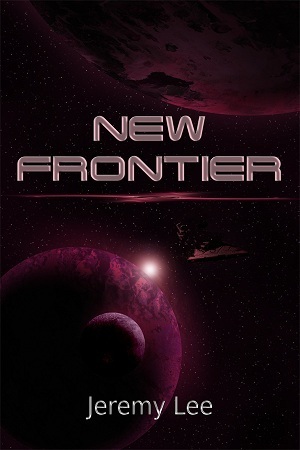
Chapter One – Now
Space is a silent and vastly dead expanse, yet filled with
marvels of life, twists of physics, furnaces of unimaginable fire, and
wastelands of matter-shattering cold. There
is no greater ocean for humanity to sail, no more perilous journey, and none
more yearned for by generation upon generation.
Tentative steps into the endless frontier inevitably are loosened into
giant leaps, but adventure brings with it failures as often as glory.
Light years from Sol and the comforts of home, humanity’s
greatest leap lay strewn across hundreds of miles, now little more than
smoldering wreckage of dreams feebly forged into reality. The once sleek and vaguely arrowhead shaped
craft so many people cheered on its way was drifting wounded and listless. The daring vessel, audacious by design, the
main body accompanied by four sets of engines jutting from either side, shot
through space scattering bodies and shards of metal and freezing vapor leaking
from its own wounds. It was the
culmination of centuries of leaps and stuttering steps forward in science and
engineering. The Argos, now rent down
the middle nearly in half, and the scar ran forward from the reactors at the
aft reaching for the bow.
Bodies floated in space among the debris, some of them sucked
out so suddenly into the void that the immortal looks on their faces weren’t
even surprised. They had been asleep, or
monotonously going through their shift, now they were frigid corpses floating
among the charred debris. Summersaulting
about its axis three quarters of the Argos continued to make an orbit around a
red and purple planet, no sign left of their assailants.
From the missile tubes arrayed along the bow and reaching back down
the starboard side of the ship the second, third, and fourth decks looked out,
ripped open, the scar exposing the interior of the ship only stopping at the
stern where the secondary airlocks and engine room resisted with doubly
reinforced bulkheads. Most of what was
exposed was the crew quarters and mess hall, and most of the victims of the
initial onslaught had been off duty. The
emergency systems to seal off hull breaches at the doorways were methodically
coming on-line, but they couldn’t move nearly as fast as a vacuum.
The tear stopped just short of the science labs, now mostly
stripped bare of experiments and instruments.
Banging through the doors and gaping openings supplies, equipment, and
people from all over the ship flew and crashed, drawn up toward the grasping
expanse of space.
Hector de Anza felt himself flying through the air, as
everything else not strapped to a bulkhead, ripping out of the ship. He thrashed about with his hands and feet,
anything to grab hold. Even in the rush
he could feel the air getting thinner and the temperature plummeting. He’d never thought of himself as a man afraid
of dying, but he didn’t know if the savior would find his soul out here. Then he prayed passionately for all the poor
souls he couldn’t save, even if he didn’t yet know his own fate.
Catching on a storage locker in the lab it took all the
strength the man had to hold fast, his legs still streaming out behind him as
space tried to lay claim to him as well as the air whipping past, even amidst
insanity and desperation Hector called out to his God. He couldn’t resist and chanced a glance past
his feet. What should have been a
corridor lined with crew cabins was open to the endless black.
He lashed out with his free hand as another body started to
flash past in a bid to save at least one more.
He caught hold of the poor man by the elbow but his hand slid down his
arm as he nearly ripped loose. Hector
finally gripped him by the hand and fought to keep him from flying free.
Hector held on as tightly as he could, but he felt both the
man’s hand in his as well as his hold on the locker slipping. With a breathless, soundless, scream he gave
his all to save both their lives. He
felt himself drifting off into oblivion. Hector wasn’t strong enough to battle the
nothingness of space, no matter how desperately he wanted to hold to life.
No matter how vehemently he squeezed Hector felt the crewman
slipping from him. One second Hector
could still feel him, hand in his, and the next he was watching as the poor
crewman flew into the void. Hector
looked the wretched man in the eye, saw terror marking his face, the last few
gasps for air which wasn’t there, and the glossy look of peaceful death which
washed over him at last.
Even as he watched the crewman die the emergency bulkheads were
sliding into place. What felt to him
like an hour of insanity and pain in truth lasted no more than ten seconds
since the air first began to vanish out the rent hull.
As soon as the new bulkheads locked down into place sealing off
the laboratory from the rupture the swirling rush of air died almost at once
replaced with near nothingness. The
quiet hurt nearly as badly as the earlier tumult, and carried an eerie pall and
omen of the tomb. Hector’s sweaty hand
slipped off of the storage locker, as much from exhaustion as because it was now
safe. The air was still thin, and his
body floated in the absence of gravity.
The temperature had plunged to well below freezing in an instant and his
body could hardly take the strain.
With a howl of frustration that he couldn’t suppress Hector
tried to struggle on, the sharply steep stairs that they’d taken to calling a
ladder that led down to the engine room was only a few feet away and he tried
to glide over to it. Stars were popping
before his eyes, and he could barely move his limbs as he tried to swim and
spun about.
Having
made it all the way to the ladder Hector looked down the steps towards the
chaos of sparks and torn equipment below and he had to close his eyes to gather
the strength to go down. With a last
deep breath he tried, but he passed out just thinking of all he had to do. The cold clawed at him and the weak air left
his lungs begging. He drifted into the
blissful abandon of unconsciousness.
June 19, 2013
Stage-Door Receives Performance Attention
I've delved into the plot before, a bunch of former friends and colleagues from professional theaters in the hotbeds like New York, Chicago, and Los Angeles descend on a small community theater in Denver to attempt staging an adaptation of Homer's Odyssey with a budget of zero dollars and zero cents. It brings out the most insane aspects of very quirky people.
Amid the characters, their foibles and strengths, and the rapid fire dialogue there are smaller side adventures nestled into the main story, many of which drawn from my own time working backstage, and to my everlasting embarrassment occasion on stage, in theaters. The stories from that time of my life are like a gift which just keeps giving, bringing a smile to my face when I think of them, and occasionally drumming up life lessons learned the hardest way possible. Theater gave me focus, ambition, and a dream which in many ways I still pursue to this day, all of which are why I dedicated the novella to my high school theater teacher Mr. Frank Earley, the man who helped a directionless kid with a lot of energy finally start working towards something in life instead of just drifting through.
First and foremost Stage-Door is a comedy, and Charlie James' performance captures the high intensity, verbally dexterous, pop-culture laden, humor with panache and speed. It makes Stage-Door fly past, but you'll be chuckling the whole way through. I'm signing off with a customary picture-link to the novella's page on Amazon for those of you who may want to give the old-fashioned text version a try, and the link to the audio version will appear on the page as soon as it comes out. I do hope you'll come have an adventure with me in the world of theater.

June 17, 2013
El Dorado discovered, the Lost City of Z
It is a place that hundreds, perhaps even thousands, have died trying to find. A place that has been alternately dismissed by both scientists and spiritualist, and described as mythology and archaeology. Yet in the Xingu region of the Amazon perhaps the great mystery of El Dorado has finally passed from legend into reality.
When Spanish Conquistadors first came to the Amazon and began trying to penetrate inland into what has been called a "false paradise", the forbidding and brutal jungle where one can be surrounded by food and starve to death or bitten by any one of hundreds of disease carrying bugs, those that managed to return came back with amazing stories. They spoke of causeways and grand roads through the trees, great cities, thousands upon thousands of Indians, and wealth of gold that can hardly be imagined.
Yet as later explorers hiked into the jungle with a lust to find the illusive El Dorado they could find nothing but unforgiving terrain, sweltering heat, and bands of supposedly primitive Indians. Early scientists declared that the region could never have supported an advanced civilization and began to treat the Amazon as a wasteland, some even equating it with the Sahara.
Map Of Percy Fawcetts Expeditions
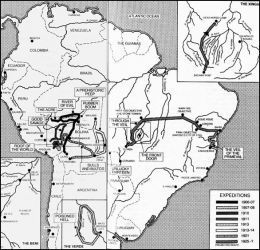
Map of Percy Fawcett's Expeditions
Fawcett and the Early Expeditions
Yet like Atlantis or Shang-ri-la the legend of El Dorado refused to back away, it was lodged so firmly in the imagination that many people refused to accept that it was not real, and were willing to risk their lives in pursuit of it. At the end of the nineteenth century and the dawn of the twentieth mankind was embarking on one of the most monumental tasks in all of history, mapping the world. There would no longer be blank spaces on the map or regions marked "unknown". One of the greatest and most daunting places left for explorers was the Amazon.
Percy Fawcett began his career as a map maker and explorer cataloging the disputed border between Bolivia and Brazil. He made a name for himself by being unafraid to venture away from the rivers and move inland. He, like many other explorers of the region such as Brazil's Rondon, adopted a policy of peace with the native Indians and gradually grew to respect them immensely. Through all of his early expeditions Fawcett was starting to put together a theory, he found what he swore were shards of pottery, and swaths through the land that looked to him like roads. He began to suspect that the traditions of the Indians he met were handed down to them from a great lost civilization, which he began to refer to as the Lost City of Z.
Just as Fawcett and a few other Amazon explorers were starting to revive the legend of El Dorado most archeaologists and scientists were attempting to exorcise the myth entirely. Most had concluded that harshness of the Amazon would prevent civlization, that there was too little food, too many dangers, and too turbulent of a rainy season to allow anything more than a hunter/gatherer society to mature.
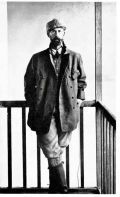
Percy Fawcett
In 1925 Fawcett, along with his son Jack and Jack's best friend Raliegh, disappeared into the jungle after declaring that they knew where the Lost City of Z was and that they would return in a year or two after completing a fist survey. Years went by and there was no word from the party and their disappearance was added to the mystery of El Dorado, and the mystique of the rain forest.
Dozens of rescue parties went in search of Fawcett, and many believed that they had found the Lost City and were living out their days in a hidden paradise, but as the years went by people began to dread that the explorers were dead. Claims that they were killed by "savages", starvation, or predators, paled next to the accusation that they died pursuing a "mad man's" dream. The Fawcett family lived to see Percy Fawcett's work derided as a foolish fantasy and El Dorado, so briefly reignited, faded once more to be firmly placed in mythology.
The fantasy made itself unattainable, even Fawcett had allowed his own prejudices and goals to conflate with the evidence that he had uncovered. Europeans could not help but imagine that it was a city made of stone, a city like those found in Europe, the Middle East, or Asia. There was also a desire for paradise, for granduer beyond even our wildest dreams, and Z began to merge with the myths of Atlantis.
The Legend Grows
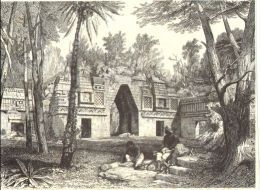
Imagining of the Lost City of Z
El Dorado became a lost pinnacle of humanity, with wonders that even modern science was supposed to pale against. Like Atlantis, the lost city began to grow in the imagination. No longer simply a city of gold in the midst of the rain forest, El Dorado became a home of science fiction. Mechanical and social marvels were credited to the place, from cars, to planes, to geothermal energy. Others went further and began to describe it as a doorway to another dimension or a gateway to the stars. Religions were founded with the lost city at the center, some even holding Percy Fawcett up as a messiah or prophet figure. The fantastic was so intertwined with the legend that the two seemed inseparable.
One of the hardest truths of the fantasy of El Dorado was the racism that has always been mixed with the legend. The civilization at the heart of the story was often described as "White Indian" and the people that lived as hunter/gatherers that the explorers encountered were dismissed outright as not even capable of such a feat. Even those that held on to a belief in El Dorado as science declared the matter closed chose to ascribe the inhabitants of the place as a different people altogether from the tribes of the Amazon. Some chose to believe in a "master race", others in a lost tribe of Israel, others in transdimensional beings, and others still in aliens. This is not entirely a product of Victorian prejudice, there were many myths of pale heroes and gods circulating among numerous tribes, and especially further north with the Aztecs at the time of the Spanish landings. However, the racial perspectives of the time helped to color and saturate both what explorers were looking for and how they observed the natives.
Yet when archaeologists once again began to study and look at the tribes of the Amazon, and study their oral history, some began to once again believe in El Dorado. They stripped away years of exaggeration and mythologizing.
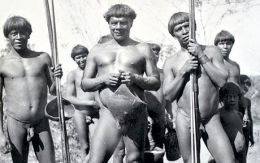
Modern Discoveries
First in his 2005 article "The Lost City of Z" and later in his full book of the same title David Grann reported that archaeologist Michael Hickenberger was unearthing a site in the Amazon Xingu region that might be the mysterious lost city. The city was surrounded by not merely a single moat but several in concentric circles and had palisades much as several nearby tribes described in their folklore. What was more, he found evidence of wooden structures and roads that cut through the jungle. There was black Indian earth which showed evidence of people making the infertile soil of the Amazon rich for planting.
Perhaps most intriguing were the direct parallels between the site, referred to as Kuhikugu, and tribes of the area. Pottery methods were still nearly identical and the tribes followed a diet that prohibited several sources of food (striking considering the long held belief that such prohibitions would mean death in the harsh rain forest). Even the villages were still laid out in similar patterns to the sites of the ancient cities.
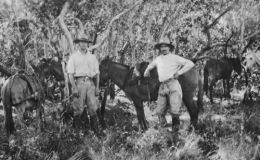
Fawcett on his first expedition to find Z in the Xingu Region
Kuhikugu encompasses more than 20 settlements, each supporting as many as 5,000 people with a remarkable sense of engineering. Though made of wood instead of stone the society flourished from approximately 200 A.D. until around 1600 according to carbon dating data obtained from the moats and pottery. They built bridges across some of the great rivers of the Amazon, and though they refrained from pyramid structures like the Mayan or Inca, they appear to have preferred to build horizontal monuments.
These people overlapped with the coming of the Europeans to the New World, and in only a few short years were so devastated by disease that they virtually died out. The earliest conquistadors saw glimpses of their civilization, but by the time they were able to penetrate the rain forest again the people were all but gone and the jungle was quickly reclaiming the land.
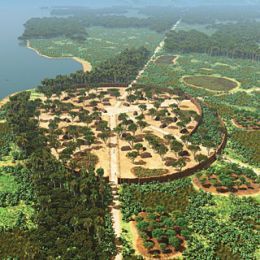
An aerial view of the Kuhikugu site
In conjunction with this amazing find is the discovery of pottery in a cave which predates even the earliest Clovis find, causing archaeologists to have to readdress the question of early man migration patterns. Some are going so far as to begin to suggest that rather than being a harsh climate where man could barely survive that perhaps the Amazon was in fact a "womb of nations" that people radiated out from such as the Eurasian Steppe or Scandinavia.
It is perhaps fanciful to call Kuhikugu El Dorado, but after a hundred years of modern archaeology claiming that it wasn't there and then finding it in a time when people claimed that the edges of the map were complete, I'm a bit prone to fanciful phrases.
*A large amount of research for this article was drawn from David Grann's bookThe Lost City of Z, and the Scientific American article Lost Cities: Pre-Columbian Life in the Amazon which I heartily encourage anyone interested to check out. These are both very accessible starting points for anyone looking to begin their own research adventure.
June 14, 2013
Love Thy Neighbor, a haunting review of nonfiction
Still one of the most haunting pieces of nonfiction I ever laid my hands on, Love Thy Neighbor is a rich and terrifying account by Peter Maas about his time covering the Bosnian War in the early nineties. This is nothing short of a life experience hiding in the form of a book upon the shelf. While the tale is full of disturbing and intimate details about the war specifically but at its core this is an account of the insanity of man, the horror of ethnic war, and one of the most in depth looks at what drives a modern civilized human society into a barbaric horde. As is pointed out in one passage this is a story of genocide taking place in modern Europe, a land where we don't consider such things possible any longer.
Maas went into Bosnia unaware of what was happening, he had to slowly allow his brain to catch up with everything all around him. In the books haunting first chapter he speaks of the smell of animals, that he had never before smelled anything like the refugees that were pouring into Croatia. Dangerous trips into death camps, no man's land, and Sarajevo follow. Encounters with Serbs, Bosnians, Croatians, and U.N. soldiers leave the line between who is good and who is evil forever blurred. The book walks the line between this dynamic exploration of right and wrong, humanity and brutality, truth and lies, without ever treading into the deplorable realm of preaching. Maas seems almost ashamed of himself when he looks back on how be behaved, far from taking the holier than thou road he adopts the opposite track, a look at how we all looked the other way for so long as this conflict devoured lives at a rapacious pace. In the end this was a war which brought ethnic cleansing back to Europe at the end of the twentieth century, and Maas, and anyone who reads the book, wants to know why. How did Milosevic and so many other perpetrate such a catastrophic.
A book like few others I have ever picked up, it's been several years now and I still think back to this incredible text. This was a dynamic read that forced me to slow down and look at life in another way.
June 10, 2013
Where I'm Bound, I Really Didn't Have a Clue
Let's back up a second, what I first thought of, and almost burst out laughing when I did, was just how absurd it was that the novel turned out the way it did at all. When I first got the inspiration and sat down to begin the long process of forging a story the real idea was to write an adventure novel set in the first world war. Follow some plucky young kid as he attempts to navigate through the greatest disaster in the history of mankind, throw in a little romance, some courage, a touch of comradely brotherhood, but use the war as a backdrop from some Horatio Hornblower type character to rise above.
So, what happened?
Two thing simultaneously began to change the story even before I finished the first chapter (the one where Teddy joins up for those of you who are interested). My research into The Great War made it difficult if not impossible for me to treat the battles and devastation as a playground for an adventure tale, at least in the sense that I first envisioned, and secondly my imagination ran away with me. One night early on I sat out on the balcony enjoying a drink and staring into space, thinking about the story and working out where Teddy might go and what parts of the war might make it into the novel, when in my head I reached 1919. I wasn't done, I started thinking to myself what would a man like Teddy do after the eleventh hour?
My first thought in the morning was a predictable one in this age of sequels and series, write more books. The problem was so much of who Teddy was required speed in the telling, the details of say the Amazon chapter might have made a pretty good book on their own, but other pieces needed marriage with other material to hold weight, many of the middle-age chapters spring to mind. At this point I wanted to tell the whole story, and so I began reworking the novel into a kind of rapid-paced life story, of this one man who's life charts the course of the twentieth century.
The character of Lee still didn't exist. There was a kid who met Teddy in the old folks home in the first chapter, and would have pulled a sheet over his head in the last, but I threw another name on him and used him more as a framing device. Then a very good friend pointed out I should name the kid after myself, just to make people question the story in a different way. Very exciting, very engaging, and I was hooked from the moment I even thought about it. Then came the real problem, I liked the character. This fictionalized version of me became, if not therapy, then a kind of sounding board for how far life brought me and how much changed over the years. I stripped away almost any redeeming qualities I might of had as a teen, making this character just shy of illiterate, unquestioning, angry, and probably more than above average self-obsessed. The idea behind the character of Lee became to take the macro-story of Teddy played out over a long period of time in these exotic locations, and bring it down to the micro-story of Lee, played out in a modern setting, in the suburbs, to show how anyone can learn and grow wherever they might be.
I'm still not entirely sure how my war-adventure tale turned into historical saga of life-lessons, but hey, that's half the fun. If you want to check out Where I'm Bound I Can't Tell, then follow the links below for either the paperback or audio-book versions, via Amazon and Audible respectively. Both versions are available elsewhere, let me know if you'd like me to change my choice of default links.
PaperbackAudio
June 9, 2013
The Madcap Adventures of Mr. Hornblower
These stories are a mixture of fiction and remarkable historical accuracy. At times Forester sacrifices, showing his characters behaving with the kind of brutality necessary in the era, and yet you like them better for seeing the lengths they would go to. One of the prime examples is the routine presence of press-ganging crews, men abducted from their lives and thrown onto these legendary British ships. These were the men who conquered the waves, and they didn't exactly choose to.
Don't misunderstand me, Horatio is a remarkable man, and seeing the world through his eyes open doors of observation onto the society of Britain at the time which defies many works set in the era, neither painting a romantic vision nor chastising but simply illuminating. Perhaps what makes this character so inviting to me, so sympathetic and intriguing, is he is a man of the mind, and though he shows magnificent courage periodically through the years of the stories, he thinks himself a coward. Hornblower attacks problems from a mental point of view, pacing up and down the deck (or in one memorable scene in Commodore Hornblower in a hotel room) and working out his latest audacious plan. While many men of the era might have achieved their fame from daring, Hornblower rises above the rest for blending courage he doesn't believe he has with genius. He out thinks his enemies more often than he out fights them.
Hornblower was written in a bygone age, not so old as to feel the same as Dickens or Austin, but old enough that in the modern era a few preconceptions, about women or race, need to be forgiven if the novel is to be enjoyed. At no point to these prejudices become the point, and in fact he often dispels the stereotypes of both pointing out exceptional people of all genders and creeds.
Perhaps if time allows I'll soon do a proper review of several of the Hornblower books individually. Right now, while things were on my mind, I thought I'd write these few words on Hornblower the series.
May 3, 2013
Island of Ghosts

One of my all-time favorite novels, from one of my all-time favorite authors, and I just sat down and re-read Island of Ghosts. Gillian Bradshaw has been among my favorite authors ever since a co-worker recommended this book to me more than a decade ago when I worked at a Barnes & Nobles in Denver. I've been an avid historical fiction reader since I was, I don't know, capable of reading above the 'See Spot Run' level, and Miss Bradshaw quickly became one of my personal favorites in the field.
Island of Ghosts is a bit different for Bradshaw, focusing on the Sarmation troops brought north to Hadrian's Wall following the Marcomanic Wars. The title comes from the tribes belief that no living thing can live across a body of water where they cannot see the far bank, so if they cross the channel there must only be an island of ghosts on the far side. The main character, Ariantes seduces the reader almost at once with his thought-provoking world view. Unlike his comrades he is suffering from regrets in the war beyond the simplistic anger of defeat, grasping that everything they lost from their freedom to his wife and child came about in a war they themselves provoked with the mighty Roman Empire. Embracing his role as captive soldier, and hoping to forge a new life for his men, Ariantes cooperates with Roman officials, and negotiates compromises which integrating his men into the legions without breaking their spirits. However, there are plots running within plots and the local Britons hope to seduce the Sarmations into their cause of rebellion, and some of Ariantes comrades are more than happy to start another war with Rome, which could cost them everything they have left, and what few friends and burgeoning new families they've begun to acquire. Ariantes must outwit princes, princesses, tribunes, centurions, picts, and governors to save his men and the new life which is only just beginning on this island of ghosts.
While the plot twists and weaves, keeping the reader simultaneously breathless and intoxicated, Bradshaw also paints a beautiful picture of Roman Britain, one exciting and dangerous and above all complete. I've loved every book from Miss Bradshaw I've laid my hands on, but this one holds a special place in my heart. Perhaps it is because the main character is a man, not to say that the customary strong women characters are not seen here in abundance. Perhaps because the time period and place are so evocative to me. Perhaps because this was the first Bradshaw I picked up. Who can say? This book has occupied a place so close to my heart for so long I named one of my favorite characters in my own Black Rose War after Ariantes.
If any of you reading this are interested please follow the link below to Amazon, I get nothing out of this other than knowing a few more people might discover Gillian Bradshaw, and I think you might just thank me after you finish this book or any of her others.
BUY ISLAND OF GHOSTS BY GILLIAN BRADSHAW
April 27, 2013
Approaching New Frontiers
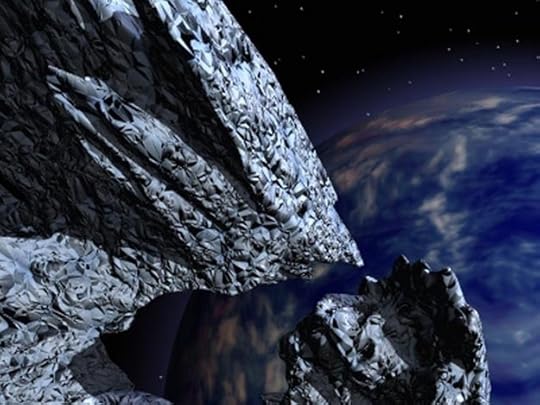
I took the bones of the comic outline, and some script which we wrote, and the very detailed series bible we'd been putting together in hopes of doing an on-going series. With these crude elements I threw myself into my second favorite part of writing, research. Previous novels allowed me to indulge in a deep rooted fascination with the past, this one allowed me to delve into science of all different fields and try and guess at which theories, prototypes, and directions might be taken. After a few months of purely researching the novel I began writing an outline for a fleshed out story, comprising both Michael and I's original ambitions and several new ones which grew in the development.
Most exciting for me were the audacious elements of the story, centering around the exploration of space being more akin to the exploration of the new world in the age of discovery than the Utopian scenario we often see. I visualized a world where most governments have fallen or become irrelevant, and massive companies replace them. This comes with a price, the pure capitalist society has a brief window of unhindered development, but bureaucracy grows where power lies, and by the time of our story these new models have a lot in common with the old political structures. Corporate competition takes on a martial quality when the companies actually command armies.

Ultimately New Frontier became a novel symbolizing, simultaneously, my own personal hopes for the future of mankind and the faults which I fear we might never break away from. The characters are drawn from many different walks of life, with myriad beliefs, ambitions, failings, and admirable traits. This book gave me new challenges as a writer, and I hope I rose to the challenge.
New Frontier will be available from Neverland Publishing in November of 2013, I hope you'll join me for the adventure.
April 1, 2013
The Black Rose War Adventure Begins...
I doubt anyone out there cares much about how I feel, it's predictable an author's thrilled with his own work, but I thought people might be intrigued with some of the ideas which went into the novel.
Black Rose War is the title of the series, and there will be five books total when I'm finally finished with this epic, but originally the title would have been Sword of Olivia. The title change, like so many other modifications came about as a product of the slow morphing of the tale into something greater and more elaborate than first conceived. The original intention was to write a story which answered a question put to me by a close friend, what is a war worth fighting? Being a history aficionado if not a professional, a fan of history as it were to quote the wonderful podcast series by Dan Carlin, I could come up with a few examples and originally intended to write another historical piece. The problem for me was characters, I began creating a plethora of characters in my head and few of them fit with any single time-period, and then a friend dared to suggest setting the place in a fictional place and time. It seems so simple now, but at the time it hit like a thunderbolt. The truth is all those years ago I began writing the piece as a play (I was still writing only for the stage back then) and when it proved too big a tale for three acts and a stage I wrote a series of three novels. When I sat down to review them, to my horror after sending them out to a few people for consideration, I then threw them out, the truth is I was too young to write the story I wanted, I didn't know the first thing about a bunch of the concepts I wanted to explore and being so young the piece came out preachy rather than thought provoking. Writing about young love and exuberance came naturally enough, but older characters didn't feel real, nuance became lost, and youthful certainty about right and wrong bogged down the tale. I moved on and wrote a few other things, plays, short-stories, a few film scripts, and eventually novels, grew up a little facing the things life has to offer all of us on a daily and yearly bases, and then, because the idea refused to go away in the back of my mind, took another stab at it. The second version went too far in correcting the problems with the first and after finishing the first book in the planned series I realized it had little meat on the bones and turned out as nothing but an action/adventure tale with too many retreads of classic sword tales. So again I threw it out, moved on to other projects, and came back to it when I started working with some comic books. I wrote a sprawling version for a series of graphic novels which finally began to live up to my expectations for what the story should contain, debates over liberty rather than answers, questioning right and wrong, exploring love and the way it twists human beings into something different than we are alone. The problem was as an illustrated project the tale quickly became expensive to fund any publishers showing any interest weren't sure they could sell a fantasy novel which, despite having fantasy creatures both classic and of my own creation, had no magic, no true 'bad guy', and a war as cerebral as it was breathtakingly violent. So again I moved on to other projects before deciding to finally sit down and get this story out of my system. I think it's worth the wait, what I'm writing now I couldn't have done without the years of life experience and the years of writing so many other pieces developing as a writer and a man.
March 18, 2013
Shalimar The Clown
Fundamentally, as many novels are since the attacks in 2001, this is also an exploration of religious terrorism. Set in the idyllic valleys of Kashmir, and a stylized version of Los Angeles and Germany during World War II, this book explores what builds and then breaks several key characters. Some of them find renewed strength as their worlds come apart, whether at the hands of Nazis, Muslims, Hindus, or apathy. What excites is the careful treatment of Shalimar's journey, from kind-hearted child to ruthless killer, not because of religious belief as he often pretends but because of a personal betrayal which makes him so filled with hate he never wants to stop killing.

This book thrills, delights, and weaves a captivating spell which stays with you for quite some time. If you enjoy lurid language, captivating visuals, and a magical reflection of reality then I cannot recommend this book nearly enough.



